Plane Blast Kills Zia of Pakistan, U.S. Envoy : All 37 Aboard Die; Sabotage a Possibility
- Share via
ISLAMABAD, Pakistan — President Zia ul-Haq, Pakistan’s military ruler, was killed Wednesday along with U.S. Ambassador Arnold L. Raphel, the senior U.S. military attache and 10 senior Pakistani generals when the president’s plane exploded in midair moments after takeoff from a remote desert town. The government said it did not rule out the possibility of sabotage.
After a marathon Cabinet meeting that ended just before midnight local time, a state of emergency was declared throughout the country and the chairman of Pakistan’s national Senate, Ghulam Ishaq Khan, was installed as president.
In a televised address early today to his stunned nation of more than 100 million, Ishaq Khan vowed to hold national elections as scheduled on Nov. 16 and announced the formation of an emergency ruling council dominated by civilians.
“Our faith in democracy will not be shaken,” declared Ishaq Khan, who is Pakistan’s first civilian leader since Zia, 64, seized power in a military coup 11 years ago. “We will proceed on the shining path of democracy with all determination.”
Investigation Ordered
The government ordered an immediate investigation into the “tragic accident,” which claimed a total of 37 lives. And “the possibility of sabotage cannot be ruled out,” Ishaq Khan declared, without naming any potential suspects, either within his politically troubled nation--one of America’s key strategic allies in Asia--or on its two embattled borders.
Ishaq Khan added, “It is now all the more necessary for us to watch carefully the unholy designs of our enemies.”
Despite the sudden death of Zia, a sometimes ruthless military leader who ran Pakistan single-handedly for more than a decade, the nation remained peaceful throughout the night, with no celebrations and few tears shed publicly.
Details of the explosion remained sketchy. Official reports said the Pakistani air force C-130 transport plane blew up a few minutes after takeoff from the town of Bahawalpur, 350 miles south of the capital of Islamabad.
Unconfirmed Reports
Initial, unconfirmed reports suggested that the plane had been hit by a missile or had collided in midair with another aircraft. But the Pakistani government later refused to confirm those reports.
Raphel, 45, was a career Foreign Service officer who had been involved in diplomacy in Southwest Asia for more than 20 years, beginning with his assignment to Esfahan, Iran, in 1967. During the Iran hostage crisis of 1979-81, he was deeply involved in efforts to secure the U.S. captives’ release.
Raphel was one of the main architects of U.S. policy toward Afghanistan in the wake of the Soviet invasion of 1979 and was named ambassador to Pakistan last year.
Also killed in the crash Wednesday was the senior U.S. military attache to Pakistan, Brig. Gen. Herbert M. Wassom, 49, the State Department announced in Washington. He and Raphel were the only Americans aboard the plane.
In addition, the chairman of Pakistan’s joint chiefs of staff, Gen. Akhtar Abdur Rahman, and Lt. Gen. Mian Mohammed Afzaal, the deputy army chief of staff, were among the dead. The victims also included three major generals, five brigadier generals and a number of other officers, as well as 13 crew members.
The U.S. and Pakistani officials had spent the day in Bahawalpur observing the testing of the new U.S. M-1 Abrams tank, which Pakistan is considering for its armed forces.
Eyewitnesses near the Bahawalpur airport said thousands of villagers rushed toward the crash site within minutes of the explosion, but military and police authorities immediately cordoned off the area.
An official report issued today said investigators were still searching the site for remains. The wreckage was “scattered over a very large area,” it stated, and a senior government official said that no official funeral plans would be made until the site was thoroughly examined.
10 Days of Mourning
Meanwhile, flags were lowered to half-staff today as Pakistan began 10 days of official mourning.
In Santa Barbara, where President Reagan is on vacation, White House spokesman Marlin Fitzwater said: “The President of course passes along his deepest sympathies to the people of Pakistan, to the families of the ambassador and President Zia and all the people on the aircraft. But at this point we are still lacking details of what happened.”
Raphel’s wife, Nancy, is well known to the Reagans and particularly is a friend of First Lady Nancy Reagan, Fitzwater said, adding: “So there is a great personal feeling of loss.”
Vice President George Bush said at a news conference in New Orleans that Pakistan and the United States “have a very special relationship, and the loss of Gen. Zia is a great tragedy.” He called Raphel “an outstanding ambassador.”
Also in New Orleans, Secretary of State George P. Shultz called for a moment of silence at a luncheon he was attending. He called Raphel “a man of immense ability who’d been doing a superb job.”
Zia came to power in a 1977 coup as army chief of staff and arrested Prime Minister Zulfikar Ali Bhutto, who was tried and executed. Ever since the hanging of Bhutto in April, 1979, Bhutto’s family and his many supporters have been seeking political revenge.
Indeed, in recent months Zia’s most imminent political threats have been from within.
In a move that most analysts believed was meant to protect the nation’s armed forces, Zia unilaterally dismissed the National Assembly and his entire Cabinet, including handpicked Prime Minister Mohammed Khan Junejo, on May 28. Junejo was about to make public a Cabinet report criticizing the military for last April’s huge explosion at a munitions depot in Rawalpindi, which killed at least 100 and rained rockets and missiles on the capital for more than an hour.
In dismissing the government, with the exception of the indirectly elected Senate, Zia promised to hold new elections and last month set the date for Nov. 16.
At the same time, Benazir Bhutto, the former prime minister’s shrewd and charismatic 35-year-old daughter, emerged as Zia’s principal foe. As the November general elections approached, she led an increasingly unified opposition coalition that presented Zia with his most potent challenge since he took power.
Reacting to Zia’s death Wednesday night, Bhutto said only: “Life and death are in the hands of God. We will not say anything.” But, she added, “It is a positive step that constitutional measures are being implemented.”
Near Border With India
The airport where the explosion occurred is located just 62 miles from the border of India, with which Pakistan has fought three major wars since its independence in 1948.
Rajiv Gandhi, India’s prime minister, said in New Delhi on Wednesday that he was “deeply shocked and distressed” by the death of Zia and sent condolences to the president’s family, including his wife, Shafiz, two sons and three daughters.
“I hope and trust the people of Pakistan will face this crisis with fortitude and calm,” Gandhi said.
Meanwhile, Pakistan also faces a hostile neighbor on its western border. Since December, 1979, Zia has vigorously opposed the presence of Soviet troops in Afghanistan, and he has played a vital role in giving safe haven to more than 3 million Afghan refugees.
Pipeline for Arms
Pakistan also has been instrumental in providing an effective pipeline for U.S. arms to the Afghan moujahedeen resistance, whose Islamic holy war has pressured the Soviets into their current troop withdrawal after nearly nine years of brutal guerrilla war.
Border clashes have increased in recent months as the Soviets have begun pulling out their troops, and Tuesday night Pakistan released a Soviet pilot who was shot down while flying a bomber over its territory.
Zia’s death was announced without comment in both Moscow and Kabul.
During his national address today, President Ishaq Khan made clear that Pakistan will continue to pursue the same foreign policy laid down by the staunchly anti-Communist and devoutly Muslim Zia.
“I feel it necessary to declare that Pakistan will continue to follow its current foreign policy and will meet all commitments,” Ishaq Khan declared, speaking from behind the same desk that Zia used so many times to address the nation.
Aside from vague announcements on government-run television and radio just after 8 p.m. local time Wednesday, Ishaq Khan’s 10-minute, post-midnight address was the first official government statement on the tragedy. It was broadcast live on TV after four straight hours of Muslim prayers.
Ishaq Khan, a technocrat who has served as finance minister under both Zia and Zulfikar Ali Bhutto had long been Zia’s closest civilian adviser. Ishaq Khan also was Zia’s handpicked choice for the Pakistani Senate chairmanship, a post that is the constitutional successor to the presidency.
In his speech today, he took pains to praise Zia for his long stewardship of the overwhelmingly Muslim nation.
“The late President Zia’s greatest achievement is the great respect and prestige that Pakistan commands in the world community, particularly the Muslim world,” he said.
Leaders of the Muslim nations of the Middle East also said that Zia’s death marked the loss of a great Islamic leader.
Egypt declared seven days of mourning, and Egyptian President Hosni Mubarak sent a cable of condolence to Ishaq Khan, as did the leaders of Jordan, Saudi Arabia and Oman. Jordan, where Zia had served as a military adviser in 1970, ordered flags to be flown at half-staff during a three-day mourning period.
At the United Nations, Secretary General Javier Perez de Cuellar called a special memorial session of the General Assembly after the crash.
“It was with a sense of deep shock and sorrow that I learned of the tragic death today of President Zia ul-Haq,” he said. “President Zia was a statesman and a far-sighted leader who commanded wide respect throughout the international community.
Ishaq Khan said that, despite the state of emergency, the 10-member council named late Wednesday night “decided that all administration will be run according to the constitution.” He did not specify what the state of emergency entailed, but all businesses in the country remained closed today, and a heavy military and police presence was reported in sensitive areas nationwide.
Most Pakistani political analysts were reluctant to speculate on the country’s political future in the aftermath of Wednesday’s disaster, saying that the situation was too fluid to hazard a guess.
But several did speculate that the death of Zia, who was becoming increasingly unpopular and alienated from his countrymen, may actually have a positive effect on the nation.
“We won’t really know anything for 48 hours,” said veteran Pakistani analyst Husain Haqqani, who is both the country’s most respected journalist and an acquaintance of Zia.
“But it is just possible that Zia could give the nation the unity in death that he could not give it in life,” he said.
“For the last 11 years, this country has been torn apart by this blood vendetta between Zia and the family and friends of Bhutto--the man Zia had ordered killed. Now, the man who ordered that death also is dead, and this very well could serve as an equalizer.”
More to Read
Sign up for Essential California
The most important California stories and recommendations in your inbox every morning.
You may occasionally receive promotional content from the Los Angeles Times.













